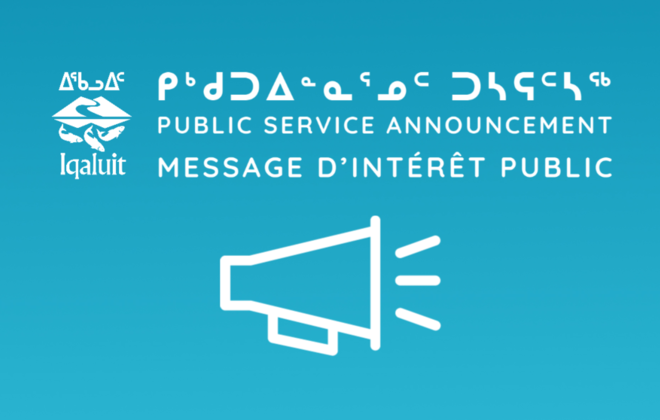
Drinking Water Update – Frequently Asked Questions (FAQ’s)
The City of Iqaluit would like to remind residents that the City’s Water Hotline (979-5603) is active and all inquiries should be submitted to this line for response. Residents are encouraged to refrain from posting questions on social media channels as the City does not have the capacity to field these messages and questions in this manner. Please follow the Public Service Announcements that are provided by the City of Iqaluit and Government of Nunavut and refrain from trusting information from unverified sources.
City of Iqaluit has created a Frequently Asked Questions list. These questions have come up the most in conversation. This list is intended to relieve some of the call volume to allow staff to connect with residents who need assistance gathering water.
Frequently Asked Questions
Q: When will water be available?
A: Treated water will be available from 11AM to 6PM daily
Q: Where will water be available?
A: Treated water will be available at Library fill station
Q: Are water truck call-outs available afterhours?
A: No, currently after hours call outs are not available
Q: Does the City have jugs for residents?
A: The City has a limited supply of water jugs available. Anyone who needs assistance can call the Water Hotline (979-5603)
Q: If we collect our own water from the river, do we need to boil the river water?
A: Yes, boiling the river water for at least one minute is recommended
Q: Are our water tanks safe to fill with water?
A: The city recommended that water tanks be drained. Once refilled, the water should be boiled for one minute before drinking.
Q: How do I clean my water tank?
A: The City recommends draining the tank, residents can perform additional rinsing or cleaning on their tanks if they wish
Q: Is the water in the trucks treated water?
A: Yes, the water received from the river is treated before delivery, however the City recommends the water be boiled for one minute before drinking.
Q: When will residents get water delivered to their homes?
A: Residents on trucked water will start receiving water as of October 13, 2021. Please expect delays with water delivery services. Residents on piped services will not have water delivered to their home, instead the water depot is available daily.
Q: Are restaurants able to serve drinks or food under the Do Not Drink advisory?
A: The Department of Health will provide guidance to food and beverage establishments in the City to advise them of further steps.
Q: Will the City reimburse residents who have their water tanks cleaned?
A: No, the City will not cover this cost.
Q: Do residents have to throw out their coffee machines, humidifiers, etc.?
A: No, you do not need to throw household appliances into the garbage
Q: How is the water quality at Lake Geraldine?
A: The quality of the water in Lake Geraldine is good, the GN is testing water and the surrounding area to ensure there are no contaminates.
Q: What is a contamination?
A: Hydrocarbon contamination (BTEX) is suspected, confirmatory testing and a thorough investigation is underway. The City is awaiting laboratory results to confirm the type and concentration. BTEX stands for Benzene, Toluene, Ethylbenzene and Xylenes. These compounds are mainly found in petroleum hydrocarbons, such as gasoline and diesel fuel, or used as industrial solvents or as intermediates in styrene or benzene production. They can enter drinking water through leaching from contaminated sites or from industrial discharges of chemical manufacturing plants, or as a result of a spill during transportation or storage.
Q: How does someone get exposed to Hydrocarbons?
A: For non-smokers, exposure to some hydrocarbons is primarily from air, and the usage of various products, including gasoline, diesel fuels, and solvents, particularly in indoor environments. Smokers may also be exposed to much higher levels. Indoor air typically represents the largest source of exposure for, with attached garages and smoking representing the largest contributors to indoor air levels. Other sources of hydrocarbons in indoor air may include glues, paints, furniture wax, or detergents.
Q: How would hydrocarbons get into the water?
A: The City is currently investigating possibly entry points. Infiltration into underground chambers at the water treatment plant is being investigated, however, not yet confirmed. The City is diligently investigating to confirm impacts.
Q: What are the drinking water quality standards for BTEX?
A: Health Canada’s has established maximum acceptable concentration (MAC) for each BTEX compound as a drinking water quality standard. Public and semi-public water systems are required to meet these standards. The maximum acceptable concentrations (MACs) are set at levels where long-term exposure over 70 years would pose a minimal health risk. MACs are set based on the most sensitive potential health effect and are considered protective of other potential health impacts as well.
The aesthetic objectives (AOs) for TEX are set at the lowest reported odour thresholds for each parameter. At levels above the AO, consumers may start to complain about the smell of the water.
Parameter MAC (health based objective) AO
Benzene 0.005 mg/L N/A
Toluene 0.06 mg/L 0.024 mg/L
Ethylbenzene 0.14 mg/L 0.0016 mg/L
Total Xylenes 0.09 mg/L 0.02 mg/L
The City has set up a Drinking water hotline, available Monday to Friday from 9-5 (excluding 12PM – 1PM) to field questions about the drinking water. If the line is busy, please leave a voicemail and a representative from the City will return your call within 24 hours. Elders or those with physical limitations are asked to call the water hotline for assistance on getting water delivered to their residence.
##
For more information during business hours contact:
Drinking Water Hotline
867-979-5603

 RCMP –
RCMP –  Fire/Ambulance –
Fire/Ambulance –  Blizzard information –
Blizzard information –